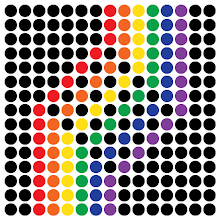Wherein the ethics of pedagogy are unexpectedly discussed
So today I took a day off work, since this is technically spring break for the U of C kids, which means nobody is around at work right now. I slept in, ran some errands, walked around in the surpringly-warm and sunny weather, sketched out a new outline for the revisions to my first chapter, and prepared an elaborate dinner. It was awesome. Mind you, I did have to go over to l’Ecole des Chartes and teach, so that detracted a bit from my day.
Speaking of which, on the way home I saw this sticker on a doorjamb close to my place: “Un élève n’est pas un client” (A student isn’t a client). Something about that statement rings quite true. Having learned and taught in at least three different university systems now, I can definitely say that a lot of friction between teachers and students (and administrators) comes from the conflation of student/teacher and client/server relationships.
But it’s not immediately clear how these relationships are different, and at least some of this opacity comes arises from the exchange of capital. As soon as money changes hands—even if it’s between a student’s parents and the teacher’s university—this inaugurates a relationship that everyone in a consumer-capitalist society is familiar with: if I’ve just given you money, you owe me either goods or services. In some cases, the expected service is to transfer knowledge, in other cases, the expected good is a diploma. Regardless, the fact of payment by the student (or on his/her behalf) gives the sense that the learning and degree-recognition are now assured. In fact, you could say that students feel entitled to the grades, exam performance, and diplomas they have purchased.
Those who’ve worked at expensive private schools or universities are probably very familiar with the term “entitled.” And there’s a reason for that: the larger the tuition expenses, the stronger students and their parents will feel that they’ve purchased a service around which they can make demands and complaints in the same genre as those they would make to their domestic servants (who don’t get enough respect, either, but that’s another blogpost). In places where tuition is largely subsidized by the state, this seems to be much less of a problem; sure, their taxes go toward supporting the educational institutions, but at least the routing of the money through the state seems to make education feel like a civic or cultural responsibility, rather than a private good (and, in some countries, luxury item). Ironically, it is in the countries where education is most conceptualized as a right that the students are the least entitled in their relations with their institutions.
So what? If there’s a financial transaction going on, isn’t is just being realistic, pragmatic, and un-romantic to treat it as a purchase rather than enrollment or registration? Is the difference between teacher and housemaid just one of class pretensions? Well, here’s the thing: pedagogy isn’t the same as service. I’m not quite sure what it is, but it has some important differences.
The first major difference is that, unlike most services, pedagogy requires action and effort on the part of the person receiving it. If you’re paying me to clean your house, you don’t have to be involved in any way with the cleaning; I wouldn’t expect you to contribute to my efforts to clean, and—most importantly—I wouldn’t fail to do my job due to negligence on your part. In the context of pedagogy, however, the teacher provide the materials and the guidance for learning, but the student’s efforts are to some minimal degree indispensible to the success of the outcome.
Furthermore, the goal of pedagogy isn’t just to give something to the student, but to cause the student to change in some way. There’s an expectation that the student not only make the effort to learn, but to develop him/herself and become a somehow different person. In French, for example, the common term for “education” is “formation,” which makes the underlying metaphor of pedagogy clearer: the goal is to shape the student into a particular form. And so, the demand of pedagogy on the student is not only to try, but to progress; this is why the protestation, “But I tried so hard!” cannot earn extra marks.
In this sense, the pedagogical relationship is a lot closer to the therapeutic relationship of therapists, fitness coaches, physiotherapists and doctors: you pay to submit to transformative practice that you hope will make you better in some way. And, much like in these other relationships, the teacher-student relationship is one where the relations of dominance and control are ambivalent at best. It’s one of the few relationships where you pay to obey.
Which is, perhaps, why these relationships are a lot less tense in contexts where the student/patient/athlete hasn’t paid directly for the pedagogy. But even in the context of completely free, subsidized education, there needs to be some way to articulate the responsibilities, rights, and powers of teachers and students (and administrators, too).




Aucun commentaire:
Enregistrer un commentaire